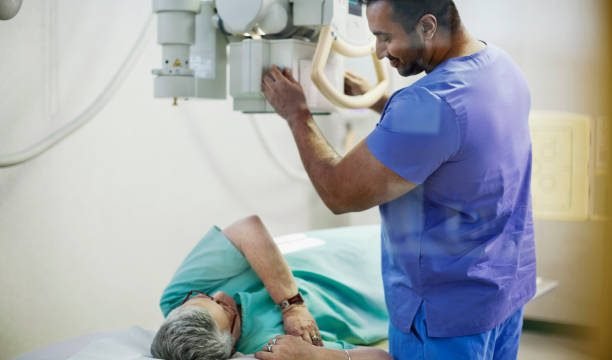
Radiography is a medical imaging technique that uses X-rays to view the internal structure of an object, typically the human body. It is commonly used for diagnosing and monitoring various medical conditions, such as fractures, infections, and diseases. The process involves directing X-rays through the body, where they are absorbed in varying amounts by different tissues. Dense materials, such as bones, absorb more X-rays and appear white on the radiograph, while less dense materials, such as soft tissues, appear in shades of gray.
25 Careers Related to Radiography
1. Radiologic Technologist (Radiographer)
- Role: Operates imaging equipment to create diagnostic images of patients’ internal structures.
- Education: Associate’s or bachelor’s degree in radiologic technology.
- Industries: Hospitals, clinics, diagnostic imaging centers.
2. Computed Tomography (CT) Technologist
- Role: Specializes in performing CT scans to produce cross-sectional images of the body.
- Education: Certification in CT imaging, often requires prior experience as a radiologic technologist.
- Industries: Hospitals, outpatient care centers, imaging centers.
3. Magnetic Resonance Imaging (MRI) Technologist
- Role: Operates MRI machines to create detailed images of organs and tissues.
- Education: Certification in MRI, usually requires a background in radiologic technology.
- Industries: Hospitals, diagnostic labs, specialty clinics.
4. Ultrasound Technologist (Sonographer)
- Role: Uses ultrasound equipment to produce images of soft tissues, organs, and blood flow.
- Education: Associate’s degree or certificate in diagnostic medical sonography.
- Industries: Hospitals, obstetric and gynecological clinics, outpatient centers.
5. Nuclear Medicine Technologist
- Role: Prepares and administers radiopharmaceuticals for imaging or therapeutic purposes.
- Education: Associate’s or bachelor’s degree in nuclear medicine technology.
- Industries: Hospitals, research facilities, specialty clinics.
6. Radiation Therapist
- Role: Delivers radiation treatments to patients with cancer and other diseases.
- Education: Associate’s or bachelor’s degree in radiation therapy.
- Industries: Cancer treatment centers, hospitals, outpatient clinics.
7. Interventional Radiology Technologist
- Role: Assists in minimally invasive procedures guided by imaging technology.
- Education: Specialized training in interventional radiology, typically after radiologic technology certification.
- Industries: Hospitals, specialty clinics, outpatient surgery centers.
8. Mammography Technologist
- Role: Performs mammograms to screen for and diagnose breast cancer.
- Education: Certification in mammography, generally requires radiologic technology background.
- Industries: Hospitals, breast imaging centers, women’s health clinics.
9. Bone Densitometry Technologist
- Role: Uses dual-energy X-ray absorptiometry (DEXA) to measure bone mineral density.
- Education: Certification in bone densitometry, often pursued by radiologic technologists.
- Industries: Hospitals, orthopedic clinics, diagnostic imaging centers.
10. Cardiovascular Technologist
- Role: Assists with imaging the heart and blood vessels using various techniques.
- Education: Associate’s or bachelor’s degree in cardiovascular technology.
- Industries: Hospitals, cardiology clinics, diagnostic labs.
11. Pediatric Radiologic Technologist
- Role: Specializes in imaging procedures for children and adolescents.
- Education: Certification and specialized training in pediatric radiography.
- Industries: Children’s hospitals, pediatric clinics, general hospitals.
12. Forensic Radiographer
- Role: Uses imaging technology to assist in forensic investigations and autopsies.
- Education: Background in radiologic technology with specialized forensic training.
- Industries: Medical examiner’s offices, forensic laboratories, law enforcement agencies.
13. Veterinary Radiologic Technologist
- Role: Performs imaging procedures on animals for diagnostic purposes.
- Education: Certification in veterinary radiography, often requires a background in veterinary technology.
- Industries: Veterinary clinics, animal hospitals, research facilities.
14. Radiology Administrator
- Role: Manages radiology departments, overseeing staff, budgets, and operations.
- Education: Bachelor’s or master’s degree in healthcare administration or radiologic technology.
- Industries: Hospitals, diagnostic imaging centers, healthcare systems.
15. Radiology Educator
- Role: Teaches and trains future radiologic technologists and imaging professionals.
- Education: Advanced degree in radiologic technology or education, along with clinical experience.
- Industries: Colleges, universities, training programs.
16. Radiology Sales Representative
- Role: Sells radiology equipment and imaging solutions to healthcare providers.
- Education: Background in radiologic technology or medical sales, often requires strong technical knowledge.
- Industries: Medical device companies, imaging technology firms.
17. Clinical Application Specialist
- Role: Provides training and support for healthcare professionals using imaging equipment.
- Education: Experience in radiologic technology, often requires technical certification.
- Industries: Medical device companies, hospitals, training organizations.
18. Radiology Researcher
- Role: Conducts research to develop new imaging techniques and technologies.
- Education: Advanced degree in radiologic technology, medical physics, or related field.
- Industries: Research institutions, universities, medical device companies.
19. Quality Assurance Technologist
- Role: Ensures imaging equipment and procedures meet regulatory and safety standards.
- Education: Certification in radiologic technology with specialized QA training.
- Industries: Hospitals, diagnostic imaging centers, regulatory agencies.
20. Picture Archiving and Communication System (PACS) Administrator
- Role: Manages digital imaging data storage and retrieval systems.
- Education: Certification in radiologic technology with additional IT training.
- Industries: Hospitals, imaging centers, healthcare IT companies.
21. Radiology Information System (RIS) Analyst
- Role: Manages and analyzes data related to radiology operations and patient care.
- Education: Background in radiologic technology and healthcare informatics.
- Industries: Hospitals, diagnostic imaging centers, healthcare IT firms.
22. Teleradiology Technician
- Role: Facilitates remote transmission of radiological images for analysis.
- Education: Certification in radiologic technology, often requires IT knowledge.
- Industries: Teleradiology companies, hospitals, diagnostic labs.
23. Medical Imaging Informatics Specialist
- Role: Integrates and manages imaging information systems within healthcare settings.
- Education: Background in radiologic technology and informatics.
- Industries: Hospitals, healthcare IT companies, research institutions.
24. Radiology Patient Care Coordinator
- Role: Assists patients in preparing for and understanding radiological procedures.
- Education: Certification in radiologic technology, often requires strong communication skills.
- Industries: Hospitals, outpatient imaging centers, specialty clinics.
25. Radiology Technologist Instructor
- Role: Provides practical and theoretical training to aspiring radiologic technologists.
- Education: Advanced degree in radiologic technology, along with teaching certification.
- Industries: Educational institutions, training programs, hospitals.
Frequently Asked Questions – FAQs
In this section, I would provide you with FAQs and answers on Careers Related to Radiography. Keep on reading dear friend!!!
1. What is radiography?
Radiography is a medical imaging technique that uses X-rays, CT scans, MRI, ultrasound, and other methods to diagnose and treat diseases. Radiography professionals operate imaging equipment, prepare patients for procedures, and assist physicians in interpreting images.
2. What educational background is needed for a career in radiography?
Most radiography careers require an associate’s or bachelor’s degree in radiologic technology or a related field. Specialized positions may require additional certifications or advanced degrees.
3. What are some common careers in radiography?
Common careers include:
- Radiologic Technologist
- CT Technologist
- MRI Technologist
- Ultrasound Technologist
- Nuclear Medicine Technologist
- Radiation Therapist
- Mammography Technologist
4. What skills are important for radiography professionals?
Key skills include:
- Proficiency in using imaging equipment
- Strong technical and analytical abilities
- Attention to detail
- Good communication skills
- Empathy and patient care
- Ability to follow safety protocols
5. What industries employ radiography professionals?
Radiography professionals work in various settings, including:
- Hospitals
- Diagnostic imaging centers
- Outpatient care centers
- Research institutions
- Veterinary clinics
- Medical device companies







